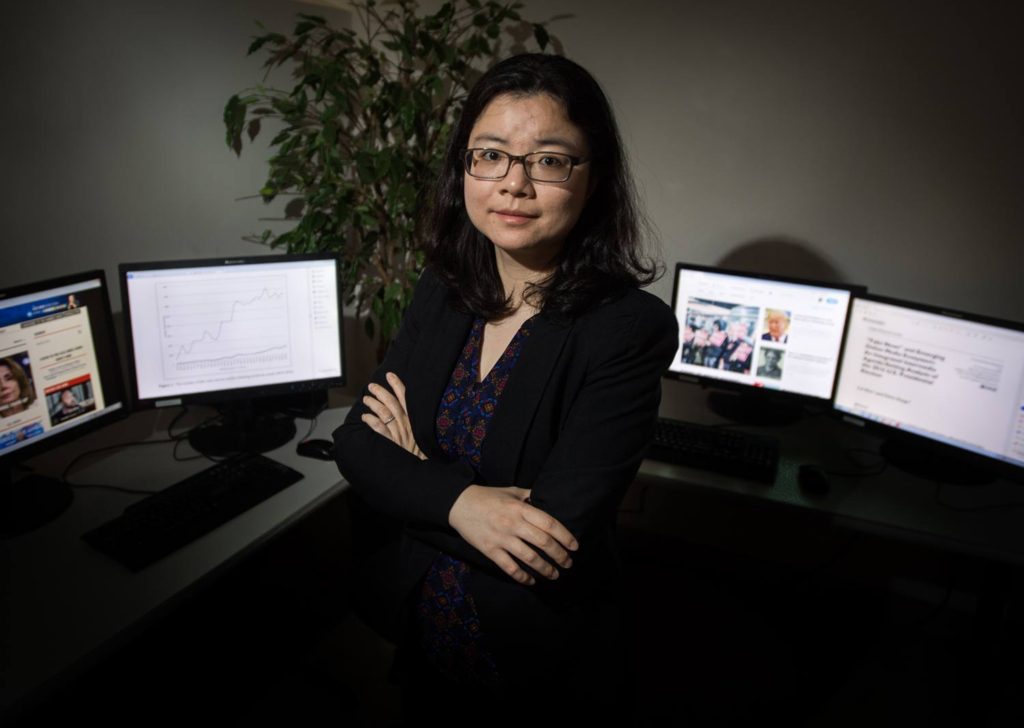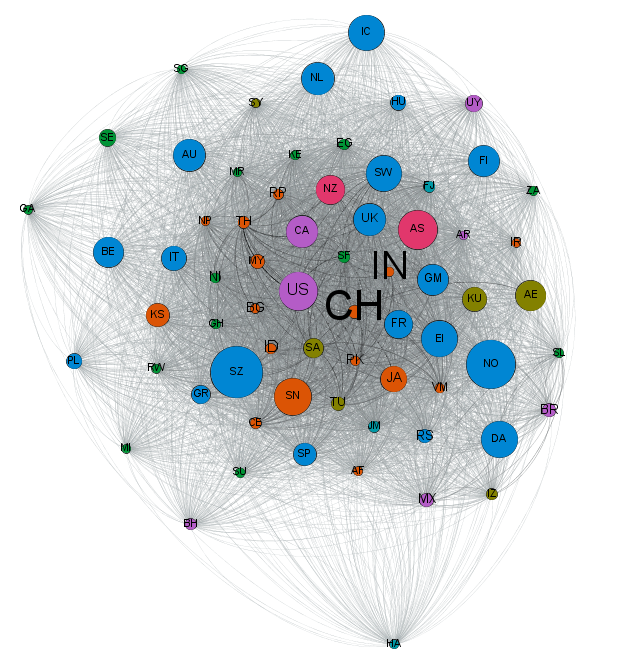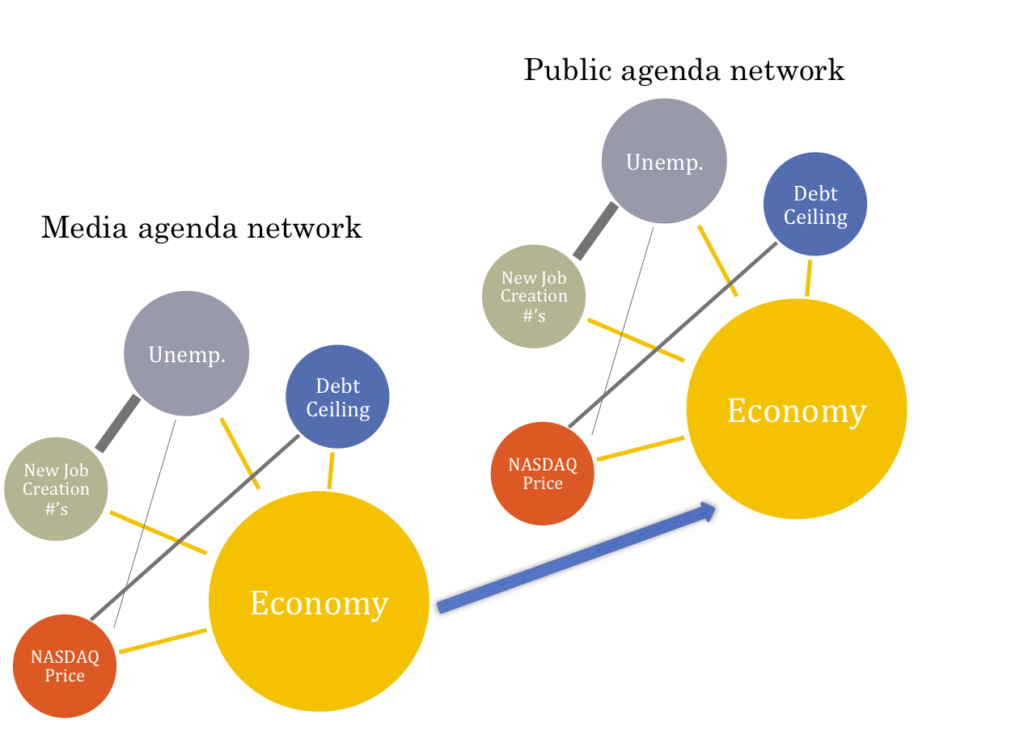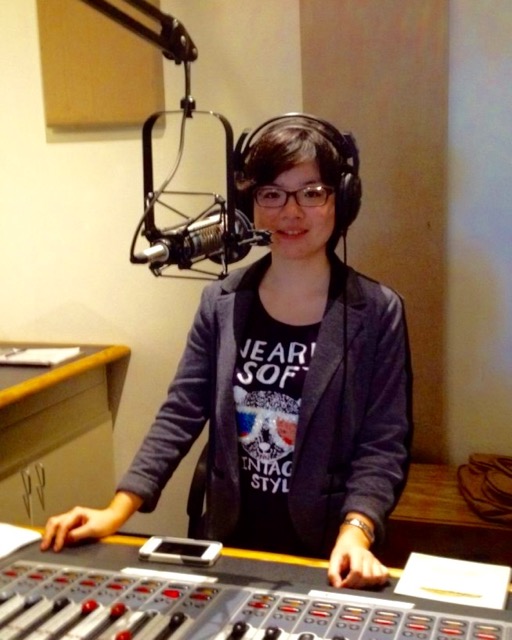Do the news media still have a significant influence on the formation of public opinion? How do emerging media change society as well as individuals’ lives? The emergence of the Internet and social media has generated new queries about the power of new and traditional media and their complex and dynamic interactions. My program of research addresses these queries and contributes to media effects research both theoretically and methodologically, particularly in four areas: the development of the Network Agenda Setting Model, informational flows, computational social science research, and emerging media and democracy.

#1 The development of the Network Agenda Setting Model
I have contributed to the development of a new theoretical model—the Network Agenda Setting (NAS) Model—to evaluate the impact of different media outlets in this transforming communication environment, particularly in the context of political communication. The NAS model, considered as the third level of agenda-setting theory, offers a more comprehensive and nuanced perspective to explain media effects, centering on the ability of the news media to define how the public associates the various elements in media messages to create an integrated picture of public affairs.
Selected publications:
- Guo, L. (2012). The application of social network analysis in agenda setting research: A methodological exploration. Journal of Broadcasting & Electronic Media, 56(4), 616-631
- Vargo, C., Guo, L., Shaw, D., & McCombs, M. (2014). Network issue agendas on Twitter during the 2012 U.S. presidential election. Journal of Communication, 64(2), 296-316.
- Guo, L. & McCombs, M. (Eds.) (2016). The power of information networks: New directions for agenda setting. New York: Routledge.
- Chen, H., Guo, L., & Su, C. (2020). Network Agenda Setting, Partisan selective exposure, and opinion repertoire: The effects of pro- and counter-attitudinal media in Hong Kong. Journal of Communication, 70(1), 35-59.
(See more about the NAS model here.)
#2 Information flows and the online media ecosystem
I have examined the diffusion of news and information among individuals on social media, as well as among various news outlets within and across media platforms. Some of my recent research projects investigated the dissemination of “fake news” on the Internet in the United States and China.

The transnational intermedia agenda setting pattern found in Guo & Vargo (upcoming)
Selected publications:
- Guo, L. (forthcoming). China’s “fake news” problem: Exploring the spread of online rumors in the government-controlled news media. Digital Journalism.
- Guo, L. & Vargo, C. (forthcoming). Predictors of international news flow: Exploring a networked global media system. Journal of Broadcasting & Electronic Media.
- Guo, L. & Vargo, C. (2020). “Fake news” and emerging online media ecosystem: An integrated intermedia agenda-setting analysis of the 2016 U.S. presidential election. Communication Research, 47(2), 178-200.
- Guo, L., Rohde, J., Wu, H.D. (2020). Who is responsible for Twitter’s echo chamber problem? Evidence from 2016 U.S. election networks. Information, Communication and Society. 23(20), 234-251.
- Guo, L. & Vargo, C. (2017). Global intermedia agenda setting: A big data analysis of international news flow. Journal of Communication, 67(4), 499-520.
#3 Computational social science research
I am an early communication scholar to explore “big data” methodologies such as data mining, dictionary-based analysis, unsupervised and supervised machine learning, and crowdsourcing, as well as its direct application in journalism and mass communication research. My work in this area is supported by the National Science Foundation and Google, among others.
Selected publications:
- Guo, L., Vargo, C., Pan, Z., Ding, W., Ishwar, P. (2016). Big social data analytics in journalism and mass communication: Comparing dictionary-based text analysis and unsupervised topic modeling. Journalism & Mass Communication Quarterly, 93(2), 332-359.
- Guo, L. (2018). Ignorance or uncertainty: How the “black box” dilemma in big data research may “misinform” political communication. In N. Stroud & S. McGregor (Eds), Digital discussions: How big data informs political communication. New York: Routledge.
- Guo, L., Mays, K. Sha, L., Jalal, M., Ishwar, P. Betke, M. (2019). Accurate, fast, but not always cheap: Evaluating “crowdcoding” as an alternative approach to analyze social media data. Journalism & Mass Communication Quarterly.
- Liu, S., Guo, L., Mays, K., Betke, M. & Wijaya, D. (2019). Detecting frames in news headlines and its application to analyzing news framing trends surrounding U.S. gun violence. In M. Bansal & A. Villavicencio (Eds), Proceedings of the 23rd Conference on Computational Natural Language Learning (pp. 504-514). Hong Kong, China: Association for Computational Linguistics.
- Akyürek, A. F., Guo, L., Elanwar, R. , Betke, M., Ishwar, P. & Wijaya, D. (forthcoming). Multi-label and multilingual news framing analysis. Proceedings of the 58th Conference of the Association for Computational Linguistics.
#4 Emerging media and democracy
In my earlier research, I built on and advanced critical media theories such as alternative media and public sphere by exploring how traditional and emerging media technologies empower people from marginalized communities both in the United States and China.
For example, my PhD dissertation investigated audience participation in one alternative media outlet—community radio—through methods of participatory ethnography, in-depth interviews, and listener survey based on two U.S. community radio stations. Results suggest that community radio continues to be relevant in this digital era. While people lose faith in mainstream media and become increasingly suspicious of online content, they still consider community radio the most trustworthy. The study also demonstrates the limitations of audience participation in community radio, and the difficulties this medium faces in adopting new technologies and adapting to this digital world.
As a part of the ethnographic study, I co-founded a radio program Chop Suey in May 2009 and had produced and hosted the show at an Austin, Texas-based community radio station KOOP for five years. Chop Suey was Austin’s first Asian radio show. Its mission was to preserve a space on the city’s radio dial for Asian music, culture, news, and events, and to provide an outlet and resource for the local Asian community. The program ended in 2014 because I graduated and left Austin, but it inspired the formation of a number of other Asian/Asian American radio programs in the city.
Selected publications:
- Guo, L., & Lee, L. (2013). The critique of YouTube-based vernacular discourse: A case study of YouTube’s Asian community. Critical Studies in Media Communication, 30(5), 391-406.
- Harlow, S., & Guo, L. (2014). Will the revolution be Twittered or Facebooked? Using digital communication tools in immigrant activism. Journal of Computer-Mediated Communication, 19 (3), 463-478
- Guo, L., & Harlow, S. (2014). User-generated racism: An analysis of stereotypes of African Americans, Latinos and Asians in YouTube videos. Howard Journal of Communication, 25, 281-302.
- Guo, L. (2015). Exploring the link between community radio and the community: A study of audience participation in alternative media practices. Communication, Culture & Critique.
- Guo, L. (2017). WeChat as a semi-public alternative sphere: Exploring the use of WeChat among Chinese older adults. International Journal of Communication.

